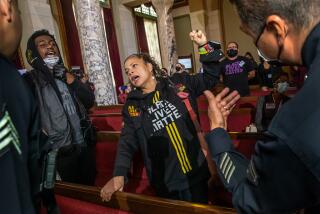Battered Wife May Sue Police for Not Protecting Her, Court Rules
- Share via
A battered wife who said her former husband beat her, harassed her and vandalized and firebombed her home while police ignored her pleas for help has the right to sue for violation of her constitutional rights, a federal appeals court has ruled.
In a decision that could expand women’s rights to police protection in domestic violence cases, the U.S. 9th Circuit Court of Appeals held that the restraining order the woman had obtained, coupled with her frequent complaints to police, may have given her the right to expect protection from an abusive husband.
A 2-1 majority held that Jena Balistreri’s lawsuit, dismissed by a federal district judge, should be reinstated for trial to determine whether police violated her rights to due process and equal protection.
“Balistreri has alleged facts which could establish either intentional harassment by defendants, or deliberate or reckless indifference to her safety,” Judge Betty B. Fletcher wrote in the opinion released Tuesday. “These allegations, if true, would implicate Balistreri’s right to be free from physical harm and restraint comprised by the due process right to liberty.”
Kate Yavenditti, a family law specialist with the Volunteer Lawyer Program in San Diego, said the decision could provide very significant help for women seeking help from police in domestic violence situations.
“It looks to me like it’s going to be a very important weapon in the very minimal arsenal that battered women have to try and protect their safety, and hopefully back up these restraining orders with real enforcement,” she said.
Balistreri, a non-lawyer who represented herself during the appeal, could not be reached for comment.
The Pacifica Police Department, the target of Balistreri’s lawsuit, declined to comment, but the lawyer who represented the department, Mark Bonino, said the decision “opens up a new area, an unexplored area” for police departments.
“Just by virtue of telephone calls made to a police department complaining about an ex-husband, that has never been sufficient before to create that obligation before this opinion,” Bonino said.
Judge Mary M. Schroeder joined in the majority opinion. Judge Laughlin E. Waters, a senior district judge from Los Angeles, dissented, saying that requiring police to provide protection to the hundreds of thousands of people who hold restraining orders poses a perplexing burden for police.
“For example, how are the police to determine when a citizen’s complaints are of such quantity and quality that a special relationship triggering the constitutional duty to protect is created?” Waters wrote.
Many of the facts that Balistreri alleged in her complaint were disputed by police, but the court for purposes of ruling on the legal issues had to assume they were true.
The courts in the past have held that police have no obligation to provide protection to individual citizens except in the case of prisoners, foster children, or others who enjoy a “special relationship” with the government entitling them to special protection.
The district court, in dismissing Balistreri’s lawsuit, found that she had no such “special relationship” entitling her to protection. But the appeals court said the district court erred in not having considered whether the restraining order obligated the police to protect her, especially in light of the department’s awareness of Balistreri’s longstanding complaints about her ex-husband.
More to Read
Sign up for Essential California
The most important California stories and recommendations in your inbox every morning.
You may occasionally receive promotional content from the Los Angeles Times.













